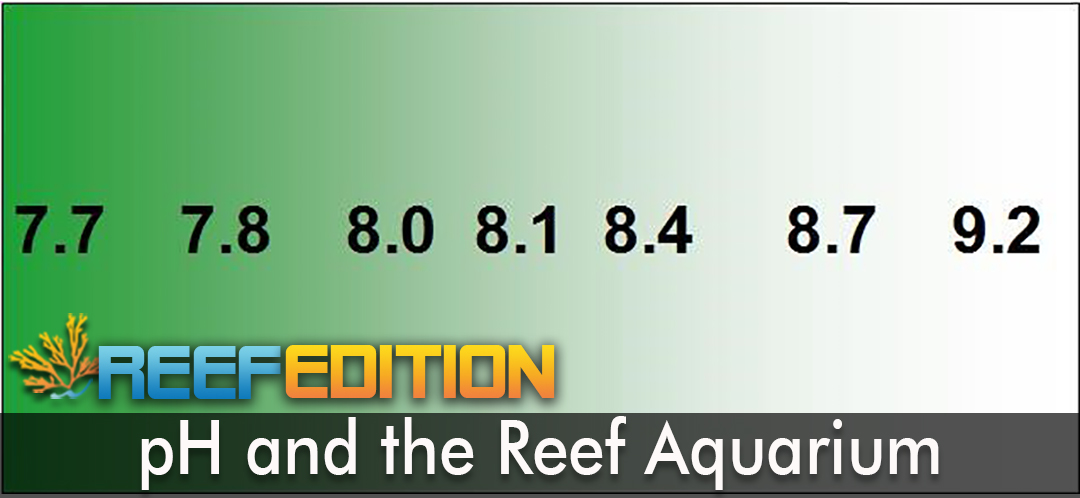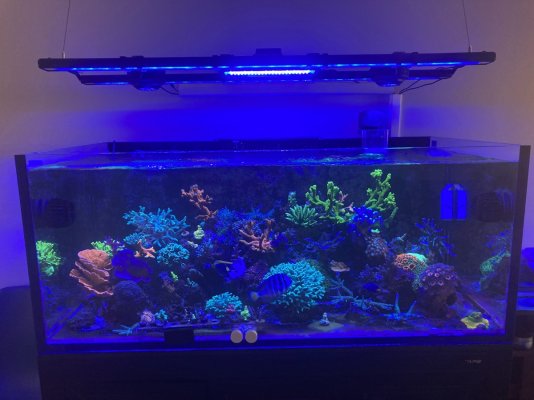Hello, I recently switched lights to Kessil AP9X. I use the same lighting schedule as before and my pH has steadily been increasing since I added these lights. Yesterday my pH has hit an all time high of 8.48 and it drops to 8.15 at night. All of my corals look great and my Xenia has probably doubled in growth since I added the lights. My tank is all soft coral. My question is will prolonged high pH have a negative impact on corals and fish? Should I try lowering it? Thank you.
Navigation
Install the app
How to install the app on iOS
Follow along with the video below to see how to install our site as a web app on your home screen.
Note: This feature may not be available in some browsers.
More options
You are using an out of date browser. It may not display this or other websites correctly.
You should upgrade or use an alternative browser.
You should upgrade or use an alternative browser.
Effects of High pH?
- Thread starter Aspect
- Start date
- Tagged users None
It should be fine as long as don’t get much higher. It may indicate a lack of aeration though. Have you got a beefy skimmer?Hello, I recently switched lights to Kessil AP9X. I use the same lighting schedule as before and my pH has steadily been increasing since I added these lights. Yesterday my pH has hit an all time high of 8.48 and it drops to 8.15 at night. All of my corals look great and my Xenia has probably doubled in growth since I added the lights. My tank is all soft coral. My question is will prolonged high pH have a negative impact on corals and fish? Should I try lowering it? Thank you.
I have 2 skimmers a Bubble Magus B12 and B9. Also 3 powerheads at the surface in the DT. Tank does have lids.It should be fine as long as don’t get much higher. It may indicate a lack of aeration though. Have you got a beefy skimmer?
It should be fine as long as don’t get much higher. It may indicate a lack of aeration though. Have you got a beefy skimmer?
aeration is what led to the high ph…
not the other way around.
as long as you’re under 8.5,
i wouldn’t worry much about it…
You should be good then, as the pH increases it precipitates stuff which has the effect of halting its rise.I have 2 skimmers a Bubble Magus B12 and B9. Also 3 powerheads at the surface in the DT. Tank does have lids.
Increasing aeration (with outside air) when the pH is above 8.2 or .3 actually decreases pH. When it’s below 8.2 or .3 it increases it (with outside air ). The actual effect is relative to the CO2 concentration of the air, obviously.aeration is what led to the high ph…
not the other way around.
as long as you’re under 8.5,
i wouldn’t worry much about it…
I also have an industrial air purifier 4500 sq ft in the room. If that makes a differenceIncreasing aeration (with outside air) when the pH is above 8.2 or .3 actually decreases pH. When it’s below 8.2 or .3 it increases it (with outside air ). The actual effect is relative to the CO2 concentration of the air, obviously.
I’ve never heard of any.Would there be any I'll effects on fish if any?
You should be fine under 8.5. That number is seemingly a magic number as in, I don't know why 8.5.
I have heard coral can become stressed over this number, but that will vary tank to tank
I have heard coral can become stressed over this number, but that will vary tank to tank
That would only be true if the outside air had a higher CO2 concentration, which is highly unlikely.Increasing aeration (with outside air) when the pH is above 8.2 or .3 actually decreases pH. When it’s below 8.2 or .3 it increases it (with outside air ). The actual effect is relative to the CO2 concentration of the air, obviously.
Lol;That would only be true if the outside air had a higher CO2 concentration, which is highly unlikely.
Randy Holmes-Farley
Reef Chemist
View Badges
Staff member
Super Moderator
Excellence Award
Expert Contributor
Article Contributor
R2R Research
My Tank Thread
- Joined
- Sep 5, 2014
- Messages
- 67,311
- Reaction score
- 63,658
aeration is what led to the high ph…
not the other way around.
Why do you say that? Aeration was important to keep pH down in my tank.
Aeration an raise or lower pH, and can actually do both in the same system at6 different times of the day, depending on whether the current pH is higher or lower than would occur by equilibrium between the alkalinity in the water and the CO2 in the air used for aeration.
Randy Holmes-Farley
Reef Chemist
View Badges
Staff member
Super Moderator
Excellence Award
Expert Contributor
Article Contributor
R2R Research
My Tank Thread
- Joined
- Sep 5, 2014
- Messages
- 67,311
- Reaction score
- 63,658
That would only be true if the outside air had a higher CO2 concentration, which is highly unlikely.
At seawater pH 8.3 and alkalinity of 7 dKH, aeration with outside or inside air will lower pH.
Randy Holmes-Farley
Reef Chemist
View Badges
Staff member
Super Moderator
Excellence Award
Expert Contributor
Article Contributor
R2R Research
My Tank Thread
- Joined
- Sep 5, 2014
- Messages
- 67,311
- Reaction score
- 63,658
Hello, I recently switched lights to Kessil AP9X. I use the same lighting schedule as before and my pH has steadily been increasing since I added these lights. Yesterday my pH has hit an all time high of 8.48 and it drops to 8.15 at night. All of my corals look great and my Xenia has probably doubled in growth since I added the lights. My tank is all soft coral. My question is will prolonged high pH have a negative impact on corals and fish? Should I try lowering it? Thank you.
The main concern with higher pH attained in reef aquaria is increased precipitation of calcium carbonate on pumps, heaters, and in sand beds (especially when they are new)..
Unless one is dosing very high pH additives, i do not think pH ever gets high enough to be a problem aside from precipitation.
Please show me in the article where it says bringing in lower CO2 air into the system will lower pH, the only case this might be possible is if the KH is ultra high and the HCO3- is being converted to carbonic acid.
It was a rather long article so I may have missed data to support you claim that bringing in lower CO2 (outside air) will lower the pH when the system is 8.2 or 8.3.
So you’re saying its the aeration and the source of the air is a moot point?At seawater pH 8.3 and alkalinity of 7 dKH, aeration with outside or inside air will lower pH.
Is it not true that in most cases outside air has a far less CO2 concentration than inside air and in most cases this will raise pH?
What if the DkH is 8 or 9?
Will aeration still lower the pH when it’s 8.2/8.3?
Randy Holmes-Farley
Reef Chemist
View Badges
Staff member
Super Moderator
Excellence Award
Expert Contributor
Article Contributor
R2R Research
My Tank Thread
- Joined
- Sep 5, 2014
- Messages
- 67,311
- Reaction score
- 63,658
So you’re saying its the aeration and the source of the air is a moot point?
Is it not true that in most cases outside air has a far less CO2 concentration than inside air and in most cases this will raise pH?
What if the DkH is 8 or 9?
Will aeration still lower the pH when it’s 8.2/8.3?
Figure 2 in the article linked below shows the approximate relationship between alkalinity and pH for different CO2 levels. The middle curve represents normal CO2 levels (at least when I made the graph, CO2 has risen outside since then), as one would get by equilibrating seawater with outside air.
if you start at high pH for the given alkalinity (like the blue curve), then aeration with outside or inside air will drive pH down and move horizontal along the graph to the black curve.
In your specific question (dKH of 9 = 3.2 meq/L and pH 8.3) you are just a tad to the left of the curve, and aeration with outside air tends to raise pH (though inside air with higher CO2 will often lower it). If that same 9 dKH has a pH of 8.4, then you are to the right of the black curve, and aeration will lower the pH.
The OP has a pH peak of 8.48. Aeration with inside or outside air will lower high pH unless his alkalinity is above about 4.5 meq/L = 12.6 dKH. He has a nightly minimum of pH 8.15. Aeration with present day outside air may be pretty neutral to that pH if his alk matches NSW, but may raise it a bit with normal reef tank alk, and aeration with inside air might do either, depending on the CO2 level in the home air.

pH and the Reef Aquarium - REEFEDITION
by Randy Holmes-Farley For many aquarists, pH is not something that they have much experience with aside from their aquarium. For many, pH is almost a black box measurement: something to be considered, but whose physical meaning makes little sense to them. This article will Read more here...
www.reefedition.com
Figure 2. The relationship between alkalinity and pH in seawater with normal carbon dioxide levels (black), excess carbon dioxide (purple) and deficient carbon dioxide (blue). The green area represents normal seawater.
Similar threads
- Replies
- 4
- Views
- 118
- Replies
- 5
- Views
- 102
- Replies
- 19
- Views
- 358
New Posts
-
-
AIO Build steveschuergers 90 gallon Goni heavy mixed reef.
- Latest: Reefing_addiction
-
-



















